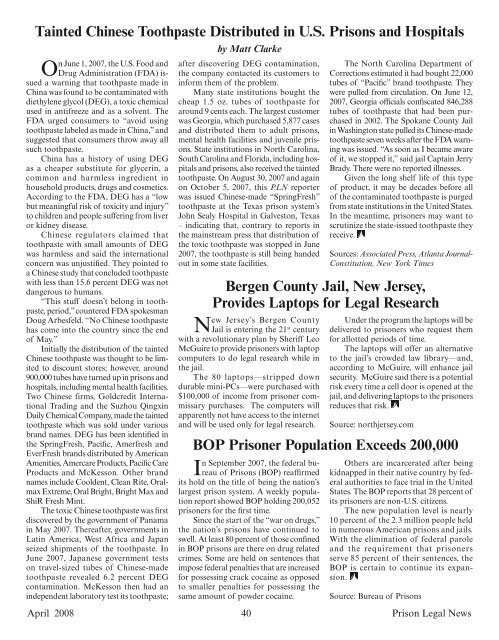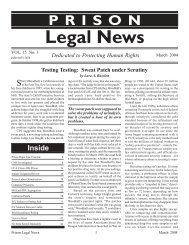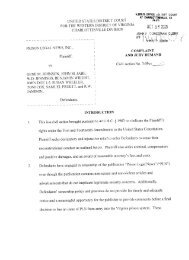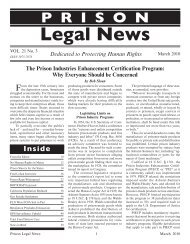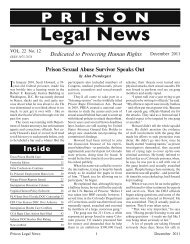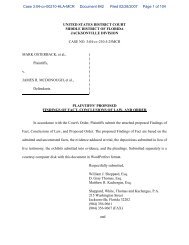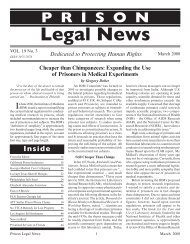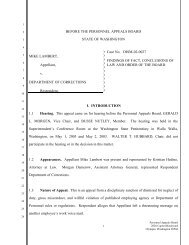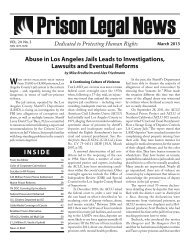From the Editor - Prison Legal News
From the Editor - Prison Legal News
From the Editor - Prison Legal News
You also want an ePaper? Increase the reach of your titles
YUMPU automatically turns print PDFs into web optimized ePapers that Google loves.
Tainted Chinese Toothpaste Distributed in U.S. <strong>Prison</strong>s and Hospitals<br />
On June 1, 2007, <strong>the</strong> U.S. Food and<br />
Drug Administration (FDA) issued<br />
a warning that toothpaste made in<br />
China was found to be contaminated with<br />
diethylene glycol (DEG), a toxic chemical<br />
used in antifreeze and as a solvent. The<br />
FDA urged consumers to “avoid using<br />
toothpaste labeled as made in China,” and<br />
suggested that consumers throw away all<br />
such toothpaste.<br />
China has a history of using DEG<br />
as a cheaper substitute for glycerin, a<br />
common and harmless ingredient in<br />
household products, drugs and cosmetics.<br />
According to <strong>the</strong> FDA, DEG has a “low<br />
but meaningful risk of toxicity and injury”<br />
to children and people suffering from liver<br />
or kidney disease.<br />
Chinese regulators claimed that<br />
toothpaste with small amounts of DEG<br />
was harmless and said <strong>the</strong> international<br />
concern was unjustified. They pointed to<br />
a Chinese study that concluded toothpaste<br />
with less than 15.6 percent DEG was not<br />
dangerous to humans.<br />
“This stuff doesn’t belong in toothpaste,<br />
period,” countered FDA spokesman<br />
Doug Arbesfeld. “No Chinese toothpaste<br />
has come into <strong>the</strong> country since <strong>the</strong> end<br />
of May.”<br />
Initially <strong>the</strong> distribution of <strong>the</strong> tainted<br />
Chinese toothpaste was thought to be limited<br />
to discount stores; however, around<br />
900,000 tubes have turned up in prisons and<br />
hospitals, including mental health facilities.<br />
Two Chinese firms, Goldcredit International<br />
Trading and <strong>the</strong> Suzhou Qingxin<br />
Daily Chemical Company, made <strong>the</strong> tainted<br />
toothpaste which was sold under various<br />
brand names. DEG has been identified in<br />
<strong>the</strong> SpringFresh, Pacific, Amerfresh and<br />
EverFresh brands distributed by American<br />
Amenities, Amercare Products, Pacific Care<br />
Products and McKesson. O<strong>the</strong>r brand<br />
names include Cooldent, Clean Rite, Oralmax<br />
Extreme, Oral Bright, Bright Max and<br />
ShiR Fresh Mint.<br />
The toxic Chinese toothpaste was first<br />
discovered by <strong>the</strong> government of Panama<br />
in May 2007. Thereafter, governments in<br />
Latin America, West Africa and Japan<br />
seized shipments of <strong>the</strong> toothpaste. In<br />
June 2007, Japanese government tests<br />
on travel-sized tubes of Chinese-made<br />
toothpaste revealed 6.2 percent DEG<br />
contamination. McKesson <strong>the</strong>n had an<br />
independent laboratory test its toothpaste;<br />
April 2008<br />
by Matt Clarke<br />
after discovering DEG contamination,<br />
<strong>the</strong> company contacted its customers to<br />
inform <strong>the</strong>m of <strong>the</strong> problem.<br />
Many state institutions bought <strong>the</strong><br />
cheap 1.5 oz. tubes of toothpaste for<br />
around 9 cents each. The largest customer<br />
was Georgia, which purchased 5,877 cases<br />
and distributed <strong>the</strong>m to adult prisons,<br />
mental health facilities and juvenile prisons.<br />
State institutions in North Carolina,<br />
South Carolina and Florida, including hospitals<br />
and prisons, also received <strong>the</strong> tainted<br />
toothpaste. On August 30, 2007 and again<br />
on October 5, 2007, this PLN reporter<br />
was issued Chinese-made “SpringFresh”<br />
toothpaste at <strong>the</strong> Texas prison system’s<br />
John Sealy Hospital in Galveston, Texas<br />
– indicating that, contrary to reports in<br />
<strong>the</strong> mainstream press that distribution of<br />
<strong>the</strong> toxic toothpaste was stopped in June<br />
2007, <strong>the</strong> toothpaste is still being handed<br />
out in some state facilities.<br />
40<br />
The North Carolina Department of<br />
Corrections estimated it had bought 22,000<br />
tubes of “Pacific” brand toothpaste. They<br />
were pulled from circulation. On June 12,<br />
2007, Georgia officials confiscated 846,288<br />
tubes of toothpaste that had been purchased<br />
in 2002. The Spokane County Jail<br />
in Washington state pulled its Chinese-made<br />
toothpaste seven weeks after <strong>the</strong> FDA warning<br />
was issued. “As soon as I became aware<br />
of it, we stopped it,” said jail Captain Jerry<br />
Brady. There were no reported illnesses.<br />
Given <strong>the</strong> long shelf life of this type<br />
of product, it may be decades before all<br />
of <strong>the</strong> contaminated toothpaste is purged<br />
from state institutions in <strong>the</strong> United States.<br />
In <strong>the</strong> meantime, prisoners may want to<br />
scrutinize <strong>the</strong> state-issued toothpaste <strong>the</strong>y<br />
receive.<br />
Sources: Associated Press, Atlanta Journal-<br />
Constitution, New York Times<br />
Bergen County Jail, New Jersey,<br />
Provides Laptops for <strong>Legal</strong> Research<br />
New Jersey’s Bergen County<br />
Jail is entering <strong>the</strong> 21 st century<br />
with a revolutionary plan by Sheriff Leo<br />
McGuire to provide prisoners with laptop<br />
computers to do legal research while in<br />
<strong>the</strong> jail.<br />
The 80 laptops—stripped down<br />
durable mini-PCs—were purchased with<br />
$100,000 of income from prisoner commissary<br />
purchases. The computers will<br />
apparently not have access to <strong>the</strong> internet<br />
and will be used only for legal research.<br />
Under <strong>the</strong> program <strong>the</strong> laptops will be<br />
delivered to prisoners who request <strong>the</strong>m<br />
for allotted periods of time.<br />
The laptops will offer an alternative<br />
to <strong>the</strong> jail’s crowded law library—and,<br />
according to McGuire, will enhance jail<br />
security. McGuire said <strong>the</strong>re is a potential<br />
risk every time a cell door is opened at <strong>the</strong><br />
jail, and delivering laptops to <strong>the</strong> prisoners<br />
reduces that risk.<br />
Source: northjersey.com<br />
BOP <strong>Prison</strong>er Population Exceeds 200,000<br />
In September 2007, <strong>the</strong> federal bureau<br />
of <strong>Prison</strong>s (BOP) reaffirmed<br />
its hold on <strong>the</strong> title of being <strong>the</strong> nation’s<br />
largest prison system. A weekly population<br />
report showed BOP holding 200,052<br />
prisoners for <strong>the</strong> first time.<br />
Since <strong>the</strong> start of <strong>the</strong> “war on drugs,”<br />
<strong>the</strong> nation’s prisons have continued to<br />
swell. At least 80 percent of those confined<br />
in BOP prisons are <strong>the</strong>re on drug related<br />
crimes. Some are held on sentences that<br />
impose federal penalties that are increased<br />
for possessing crack cocaine as opposed<br />
to smaller penalties for possessing <strong>the</strong><br />
same amount of powder cocaine.<br />
O<strong>the</strong>rs are incarcerated after being<br />
kidnapped in <strong>the</strong>ir native country by federal<br />
authorities to face trial in <strong>the</strong> United<br />
States. The BOP reports that 28 percent of<br />
its prisoners are non-U.S. citizens.<br />
The new population level is nearly<br />
10 percent of <strong>the</strong> 2.3 million people held<br />
in numerous American prisons and jails.<br />
With <strong>the</strong> elimination of federal parole<br />
and <strong>the</strong> requirement that prisoners<br />
serve 85 percent of <strong>the</strong>ir sentences, <strong>the</strong><br />
BOP is certain to continue its expansion.<br />
Source: Bureau of <strong>Prison</strong>s<br />
<strong>Prison</strong> <strong>Legal</strong> <strong>News</strong>


